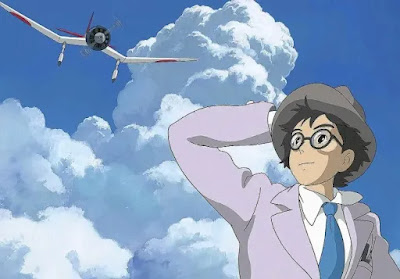The author of "Twelve O'Clock Haiku: Leadership Lessons from Old War Movies & New Poems" and "Welcome to FOB Haiku" has published a new aviation-and-war-themed poem.
The haiku sequence is part of a “Ghibli Week” themed package at The Daily Drunk Magazine, an on-line literary journal that focuses on popular culture and film. Editors there recently called for less-than-500-word tributes to the work of Japanese creator Hayao Miyasaki's animation studio, Studio Ghibli.
Poet Randy Brown's "five haiku inspired by 'The Wind Rises'" regards a 2013 animated feature written and directed by Miyasaki, which explores themes of aviation, war, and the artistic struggle to create.
Studio Ghibli animated movies are celebrated for magical character designs and dream-like settings, as well as delivering clear-eyed, nuanced, and empathy-inducing narratives.
The stories Miyasaki has written himself notably also often feature examples of flying, whether through magic or machinery. Examples include a novice witch's broom in "Kiki's Delivery Service" (1983), and a pack of swashbucklers' seaplanes in "Porco Rosso" (1992). The studio's name itself, which translates as "hot desert wind," notably also derives from an airplane design used by the Italian military in World War II.
"The Wind Rises" tells a highly fictionalized biography of Japanese aircraft designer Jiro Horikoshi (1903-1982), and incorporates unrelated story elements of The Wind Has Risen, a 1936 novel by Tatsuo Hori (1904-1953). Horikoshi aspired to make beautiful airplanes; while Horikoshi thought war was a mistake, he helped produce such war machines as the celebrated A6M "Zero" fighter plane.
As Brown writes in one haiku:
our country pays us
to make beautiful warplanes;
embrace irony
Read the rest of Brown's haiku poems here at this link.
"When I was writing 'Twelve O'Clock Haiku'—my recent deep-dive into World War II aviation, ethics, and 'bomber' poetry— I first encountered the haiku of Santōka Taneda, who protested Japan's bombing of China in the late 1930s. I was also familiar with Horikoshi's life through Miyasaki's 'The Wind Rises,'" says Brown. "I hope my Ghibli-inspired haiku inspire people to watch the movie, and, if only for a moment, to engage with a hope for peace and resilience."
In addition to Brown's haiku, a sampling of the other “Ghibli Week” prose and poetry published by The Daily Drunk Magazine includes:
- "Why I Wish Hayao Miyazaki Would Cook Me Dinner" by Darcy L. Wood
- "castle breakfast gone wrong and two haiku poems" by Abby Moeller
- "better a lost love than a forgotten sea plane" by Julia
- "Two Ghibli Poems" (including "In my dreams Jiro Horikoshi did not make fighter planes") by Gretchen
- "What Pom Poko Taught Me to Grieve" by Claire Noelle Sims

No comments:
Post a Comment
Note: Only a member of this blog may post a comment.